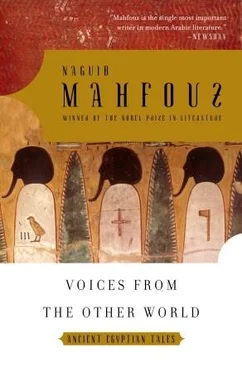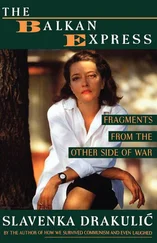Naguib Mahfouz
Voices from the Other World
Chronology of Ancient Egypt
Predynastic Period (Neolithic Period — Dynasty ‘0’)
5500–3050 BC
Early Dynastic Period (1st–2nd Dynasties)
3050–2687
Old Kingdom (3rd–6th Dynasties)
2687–2191
First Intermediate Period (7th Dynasty — Early 11th Dynasty)
2191–2061
Middle Kingdom (Late 11th Dynasty–14th Dynasty)
2061–1664
Second Intermediate Period (15th–17th Dynasties)
1664–1569
New Kingdom (18th–20th Dynasties)
1569–1081
Third Intermediate Period (21st–23rd Dynasties)
1081–711
Late Period (24th–31st Dynasties)
724–332
Greco-Roman Period
332 BC–395 AD
Principal source: Donald B. Redford, editor, The Oxford Encyclopedia of Ancient Egypt (Cairo: The American University in Cairo Press, 2001).
Translator’s Introduction
The five little-known stories that make up this volume— drawn from the vast output of Egypt’s (and the Arab world’s) greatest modern writer — are all in some way inspired by his country’s ancient past. Written in the 1930s and 1940s, in the early phase of Naguib Mahfouz’s novelistic career — which he began by publishing three books of fiction set in pharaonic times — they may well have been intended as the bases for longer works. Some are in a kind of fable form, as though adapted from folk literature or ancient texts — which, in part, they were. Yet he utterly remade them into his own, and placed them in the cutting-edge literary journals of the day, including three of them (“Evil Adored,” “The Mummy Awakens,” and “A Voice from the Other World”) in his first collection of short stories, The Whisper of Madness ( Hams aljunun , the date of whose appearance is still debated). The other two—“King Userkaf’s Forgiveness” and “The Return of Sinuhe”—have languished in the crumbling pages of aging magazines, uncollected and largely ignored.
Critics have occasionally discussed the stories (with the apparent exception of “Sinuhe”), yet they remained untranslated (but for “The Mummy Awakens,” published in English in Pakistan in 1986 1—and so they moldered unknown to those whose who do not read Arabic. That is, until now, when, like Sinuhe himself, and the born-again warrior unhappy with the changes since antiquity in Mahfouz’s mummy adventure, they have come back to remind us of our more than half-century neglect of their undeniable charms.
In his pharaonic stories as in his others, Mahfouz combines historical observation with a timeless imagination. The story here with the least direct connection to any known events or legends is the first one, “Evil Adored.” Set in still little-understood Predynastic Egypt, after the first few sentences — which explain that the country had at one time been divided into autonomous districts — it bears little resemblance to any confirmed ancient source or reality. Yet this hardly diminishes its allegorical appeal.
Likewise, the second tale, “King Userkaf’s Forgiveness,” while featuring the true founder of the Fifth Dynasty as its title character, and liberally marbled with allusions to real places and people (including Userkaf’s son and successor, Sahura), is not based upon any known incident. Indeed, the real Userkaf’s scarcely documented reign (2513–2506 BC) offered a nearly clean slate for Mahfouz’s fictional agenda. An avid reader of ancient Egyptian literature, Mahfouz may well have taken Userkaf’s final state of mind from The Teaching of Amenemhat , a renowned poem from Egypt’s Middle Kingdom. In this poem, Amenemhat I, founder of the Twelfth Dynasty (r. 1991–1962 BC), appears in a dream — after his assassination in an intrigue hatched by his chief vizier and women from his harem — to his son, Senwosret I, confirming his succession to the throne. Amenemhat sadly warns (as translated by Richard B. Parkinson): “Trust no brother! Know no friend! Make for yourself no intimates — this is of no avail!”
The next story, “The Mummy Awakens,” is perhaps the only one that Mahfouz has published that features an outright political tirade — though delivered in the 1930s by a mummy from the Eighteenth Dynasty. A tongue-in-cheek adaptation of the standard plots of Hollywood mummy movies then in vogue (as they are again today), the mummy’s character is perhaps loosely based on Horemheb, the general who served under the “heretic king” Akhenaten (r. ca. 1372–1355 BC), who later became pharaoh himself (r. 1343–1315 BC).
Further testifying to Mahfouz’s lifelong fascination with the literary heritage of the pharaonic age, the fourth story is fashioned in part from a classic Egyptian text, The Tale of Sinuhe . In “The Return of Sinuhe,” Mahfouz includes many of the ancient story’s elements— but adds a crucial one only vaguely implied in the Middle Kingdom original: the romance. Parkinson, one of The Tale of Sinuhe’s most famous translators 2and a renowned expert on ancient Egyptian literature overall, calls the nearly four-thousand-year-old poem “a fictional work of the highest artistry.” He is equally enamored of Mahfouz’s version — which Parkinson has hailed as “wonderful.”
The fifth and final story offers an appropriately spiritual exit from Mahfouz’s ancient Egyptian universe. “A Voice from the Other World” astoundingly anticipates, by at least three decades, the popular wave of “out-of-body experience” literature that swept the publishing world in the 1970s and 1980s. Yet it is almost certainly set in the time of Rameses II (r. 1198–1166 BC), as the story’s protagonist appears loosely modeled on Pentaweret (Pentu-wer) — once thought to have composed the epic poem that he inscribed on this king’s monuments trumpeting the (much-disputed) triumph over the Hittite forces at Qadesh. Likewise, the other period details are for the most part plausible. These include Mahfouz’s description of the tomb and its contents, his reference to the feast of Isis, plus his repeated use of the ancient (and still extant) Egyptian identification of the West — the land of the sunset — as the abode of Death. And, with one or two minor exceptions, Mahfouz renders the methods of mummification employed in the New Kingdom with gruesome precision. Even more importantly, however, he creates a truly vivid glimpse into that other existence after this one — and his vision is sanguine.
And so this quintet of vintage tales has been saved from the near oblivion that for many years had claimed them. The same fate had befallen his three early pharaonic novels, as well: ‘Abath al-aqdar ( Khufu’s Wisdom , 1939); Radubis ( Rhadopis , 1943), and Kifah Tiba ( Thebes at War , 1944). They had been overshadowed by his splendid Cairo Trilogy ( Palace Walk, Palace of Desire , and Sugar Street ) and other works set in modern Cairo and Alexandria. But no more. Thanks to the American University in Cairo Press, which brought out his brilliant 1985 novella al-‘A’ish fi-l-haqiqa , set in ancient Egypt, under the title Akhenaten: Dweller in Truth (translated by Tagried Abu-Hassabo), in 1998, these hidden historical gems will soon make their debut in English. (They began to appear in Europe, principally in French, Italian, and Spanish, in the 1990s.)
Together with this book, they launch a much-deserved introduction of some of the master’s finest (but most unusual, and least familiar) works to readers of English. Like their ninety-year-old author, their spirits, for all their wisdom, remain forever young — though they speak with voices from a world much different from the one for which he is best known.
Читать дальше












